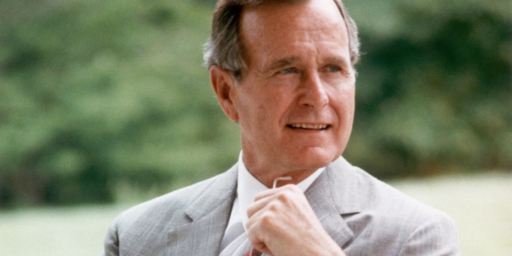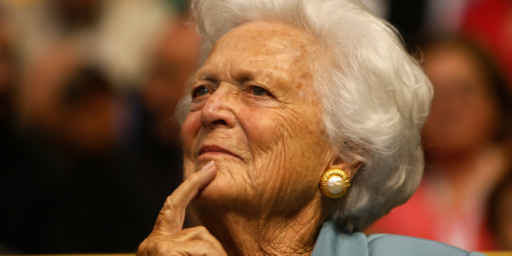The Country Didn’t Turn Right — But The GOP Did
Jonathan Rauch, writing in the esteemed National Journal, makes a rather bold pronouncement: “In 2004, The Country Didn’t Turn Right — But The GOP Did.”
The election of 2004 was one of the greatest of our era, but the post-election of 2004 was as bad as they come. Rarely have election returns been so widely but wrongly — in fact, dangerously — misconstrued. Here is the abiding reality, confirmed rather than upset by the election returns: America is a 50-50 nation.
A quick post-post-election exit poll: Which of the following two statements more accurately describes what happened on November 2?
A) The election was a stunning triumph for the president, the Republicans, and (especially) social conservatives. Because the country turned to the right, President Bush received a mandate, the Republicans consolidated their dominance, and the Democrats lost touch with the country.
B) Bush and the Republicans are on thin ice. Bush barely eked out a majority, the country is still divided 50-50, and the electoral landscape has hardly changed, except in one respect: The Republican Party has shifted precariously to the right of the country, and the world, that it leads.
Usual answer: A. Correct answer: B.
For the record, only time will tell, the truth is somewhere in the middle, and all that. Still, level-headed analysis — which is not what this year’s post-election commentary produced — shows that every element of Statement A is suspect or plain wrong.
While it’s true that pundits of both the Left and the Right are overselling the nature of the election outcome, it’s rather silly to argue that the country is still 50-50. Closely divided? Yes. Evenly divided? Not hardly.
There have been ten presidential elections in my lifetime. Republicans have won 7 of them; Democrats 3. The Republicans swept to a majority victory in both the House of Representatives and the Senate in 1994. This past election marked the sixth straight election where they have maintained their majority. I smell a trend.
Has the electorate turned right? A bit. In the National Election Pool survey, the share of voters identifying themselves as conservative increased by 5 points over 2000, to 34 percent — which, however, returned the conservative-identified share of the electorate to the level of 1996 (33 percent). A plurality of voters consistently describe themselves as moderate.
*** The upshot is that Washington’s governing establishment has moved further to the right of the country, and of the world, that Washington seeks to lead. A 50-50 country has produced a lopsided government and a sore temptation for Republicans to overreach. If they steer hard to starboard, they may capsize the boat.
That most people identify themselves as “moderate” is hardly evidence of centrism. Jesse Jackson thinks he’s a moderate. So what? And how can it simultaneously be true that the public is not moving, the Republican Party is moving rightward, and the public is voting increasingly for Republicans? Wouldn’t that seem to be evidence that the center itself is moving right?
Rauch’s point that the GOP should be careful about overreach is one that I’ve made myself, so I hardly disagree with it. It would be a mistake for Bush and company to take from the election the idea that James Dobson is the median voter. But it would also be the wrong conclusion that the voters want Bush to govern as if he were Al Gore or John Kerry.






James said: Jesse Jackson thinks he’s a moderate.
Similarly, as I noted here, Oliver Willis claims that he’s always been a moderate, but the election results have turned him into a liberal. If we had a national definition for “moderate” in this context, I would probably fall into that category, but when asked to self-identify, I always say I’m a conservative.
There’s a lot of movement going on, and it’s not all rightward. I don’t know where I’ll end up (or where the parties will), but this lifelong centrist Dem sees her party as moving left, and away from her.
I suspect each of us defines “center” relative to herself. I’ve thrown my weight on the left side of the tug-o-war for over 40 years, because I thought that end of the rope needed my weight. It’s now lighter by one.
I don’t pretend to be a moderate — I do deny being an extremist. I”m in the “happy medium” between the two.
Hmmmmmmmmm…
Go ahead dems, I dare you. Put up Hillary, make my day.
The last time a dem was pres and had a majority of dems in the house and senate they, are you ready kids, passed a huge TAX INCREASE. They have lost ground since. After Newt took over, Billy (hey baby!) Clinton couldn’t sign Republican bills fast eneough.
See you in ’08 Hill, don’t be shy.